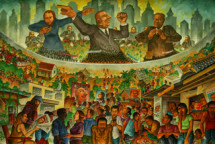Ideas into movement
Boost TNI's work
50 years. Hundreds of social struggles. Countless ideas turned into movement.
Support us as we celebrate our 50th anniversary in 2024.


White rural residents in the U.S. voted overwhelmingly for Donald Trump and his promise to restore an economic era in which working-class U.S. citizens did well, and that vote brought new attention to conditions in rural places. Political leaders, journalists and the U.S. public are asking questions about the reasons for this decisive rural vote. Rural residents of the U.S., traditionally committed to small government, have long backed Republican candidates overall, but the extent of Republican support in 2016 was different. While the majority of votes for Trump came from suburban areas, rural areas did vote overwhelmingly for the Republican candidate. Trump received 62 percent of the rural vote, more than any other Republican candidate in modern times. There is debate about the extent to which this strong support emerged from economic troubles versus the extent to which it is rooted in a rural cultural identity that is seeding a new rural populism.
On the one hand, rural areas in general have been experiencing economic restructuring and decline for decades, and over that time the federal and state governments have done little to support blue-collar workers who need to make a transition to new work. Indeed, the government pulled back on public investments in human capital just as restructuring began to change work in rural and urban rustbelt communities. Additionally, some rural people harbor resentment towards urban people and places that they perceive to be getting more than their fair share in government spending. On the other hand, some scholars and journalists argue there is growing rural-urban divide that includes not just economic differences but also “cultural” differences, different values and attitudes about what matters and where the U.S. is headed and should go.
As we will show, rural people in the U.S. feel important ties to place, and deeply value family and community. These qualities are among the most important reasons people stay in rural places even when jobs are disappearing. Many patch together livelihoods, sometimes relying on several jobs or informal work, or on disability payments and food stamps, and, often, help from family, so they can stay. In our interviews, many talk about their nostalgia for the lost economy, their “heritage,” as they put it, and see the loss of decent jobs as a cultural loss that has undermined their community and way of life. While certain characteristics and changes impact all rural places in the U.S., our research shows there are important differences depending on local and regional economic and demographic trends, as well as the historical political economy – trends that are often tied to the character and use of the natural resources in the place. Using our own and secondary data, in this paper we argue that there are three rural Americas, and that their social and economic conditions, both now and historically, help us understand the political trends that are emerging. We describe (1) areas rich in natural amenities, (2) areas undergoing profound economic and demographic transitions, and (3) chronically poor areas. Looking at the rural U.S. from this perspective helps provide a more nuanced framework for understanding the role of rural residents in current national politics, and especially in the last election.
This paper was presented at the Emancipatory Rural Politics Initiative (ERPI) 2018 Conference: "Authoritarian Populism and the Rural World"